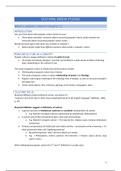Samenvatting
Samenvatting Cultural Media Studies
- Instelling
- Universiteit Gent (UGent)
Een samenvatting van de lessen van Cultural Media studies, inclusief een samenvatting van het boek 'Cultural Theory and Popular Culture' en de ppt's! Uit het handboek werden de meest essentiële zaken gehaald als aanvulling op de ppt's.
[Meer zien]





